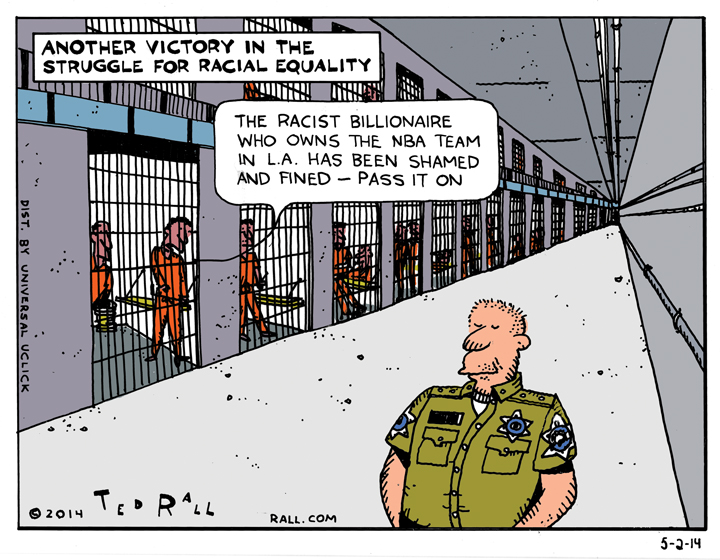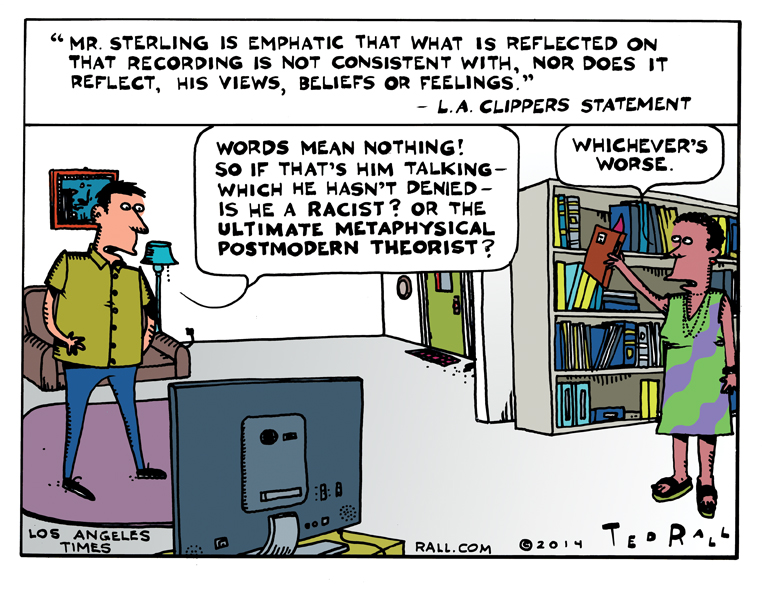Originally published by ANewDomain.net:
Want to know when political correctness crosses the line from noble social justice war to unfair censorship? When someone gets fired for saying something unrelated to their job.
That is clearly the case with Tim Hunt, a 72-year-old Nobel Prize-winning biochemist who was forced to resign from his post as an honorary professor at University College London after he brainfarted some sexist comments at a scientific conference in South Korea.
“Let me tell you about my trouble with girls,” Hunt said.
“Three things happen when they are in the lab: You fall in love with them, they fall in love with you, and when you criticize them they cry.”
Social media went crazy, and that’s fine: a Two Minutes Hate is exactly what Twitter is for.
And, to be charitable, what Hunt said was stupid. You don’t have to fall in love with your female colleagues. It is, or it should be possible, to note silently and with a pokerface said colleague’s hotness, and then get back to work. But, really. Can’t we open our minds a little?
 What Tim Hunt said isn’t that terrible: After all, people do hook up at work, and you’d have to be an idiot to argue that women don’t cry more than men. Plus, Tim Hunt is 72. Not old old, but old enough not to know the finer points of political correctness.
What Tim Hunt said isn’t that terrible: After all, people do hook up at work, and you’d have to be an idiot to argue that women don’t cry more than men. Plus, Tim Hunt is 72. Not old old, but old enough not to know the finer points of political correctness.
In context, Hunt’s words, though archaic, are harmless. And Hunt was an honorary professor. He didn’t run a lab. And he was in no position to hire or fire anyone — specifically, he wasn’t in a position to hire or fire any women.
If free speech means anything, it guarantees the right to mouth off about whatever, without having to worry about having your career trashed — especially when what you mouthed off about isn’t even related to the job you stand to lose.
I feel this stuff personally. After 9/11, when my political cartoons were controversial because they opposed Bush and his wars, I didn’t fault the newspapers, like The Washington Post and New York Times, that dropped me. The editors were cowards, yes, but they had that right.
But when Men’s Health, which didn’t run my political work, got rid of my cartoons about men, sex and relationships, now that pissed me off.
On the other side of the coin from the Tim Hunt case are those of former LA Clippers owner Donald Sterling and ex-Harvard president Lawrence Summers.
 Sterling and Summers’ remarks were far more offensive than Hunt’s comments.
Sterling and Summers’ remarks were far more offensive than Hunt’s comments.
Summers, the ex Harvard honcho, said women don’t have the “intrinsic aptitude” for science and engineering.
And former LA Clippers owner Sterling told his girlfriend that her other (black) boyfriends weren’t welcome at his (supposedly public) games: “You can sleep with (black people). You can bring them in, you can do whatever you want …the little I ask you is … not to bring them to my games.”
 Summers was forced down and Sterling was pushed out, and that’s fine. As president of the most prestigious university in the United States, Summers held power over thousands of women faculty, staff and students. How could they work for him, knowing that he thought they were stupid?
Summers was forced down and Sterling was pushed out, and that’s fine. As president of the most prestigious university in the United States, Summers held power over thousands of women faculty, staff and students. How could they work for him, knowing that he thought they were stupid?
And, more importantly, how can Summers, the now-former president of Harvard, be so stupid as to think that women are dumb at math? On the grounds of low intellect alone, he deserved to get canned.
As for Sterling, he owned a professional NBA team. Many professional basketball players are black, as are many of its fans. It would have been an abomination to continue to allow a racist to own a team whose stars included many African-Americans — all of whom would have to wonder if they were being discriminated against by their boss.
This is neither the first time nor the last time we will see this, but it must be said: The sacking of Tim Hunt is something that politically correct Internet “warriors” ought to be ashamed of.



